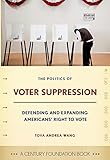The Politics of Voter Suppression : Defending and Expanding Americans' Right to Vote / Tova Wang.
Material type: TextSeries: A Century Foundation BookPublisher: Ithaca, NY : Cornell University Press, [2012]Copyright date: ©2012Description: 1 online resource (216 p.)Content type:
TextSeries: A Century Foundation BookPublisher: Ithaca, NY : Cornell University Press, [2012]Copyright date: ©2012Description: 1 online resource (216 p.)Content type: - 9780801466038
- Elections -- Corrupt practices -- United States -- History -- 20th century
- Elections -- United States -- History -- 20th century
- Suffrage -- United States -- History -- 20th century
- Voter registration -- Corrupt practices -- United States -- History -- 20th century
- Voter registration -- United States -- History -- 20th century
- Voting -- United States -- History -- 20th century
- LEGAL HISTORY & STUDIES
- Political Science & Political History
- POLITICAL SCIENCE / Political Process / Campaigns & Elections
- election laws and policies, Republican Party, electoral system, voter registration, positive reforms
- 324.60973 23
- online - DeGruyter
| Item type | Current library | Call number | URL | Status | Notes | Barcode | |
|---|---|---|---|---|---|---|---|
 eBook
eBook
|
Biblioteca "Angelicum" Pont. Univ. S.Tommaso d'Aquino Nuvola online | online - DeGruyter (Browse shelf(Opens below)) | Online access | Not for loan (Accesso limitato) | Accesso per gli utenti autorizzati / Access for authorized users | (dgr)9780801466038 |
Frontmatter -- Contents -- Foreword -- Preface -- 1. The Voter Inclusion Principle -- 2. The Early Years of Vote Suppression -- 3. Conditions and Consequences of the Voting Rights Act -- 4. Vote Suppression Goes National—and Republican -- 5. The Battle over Motor Voter -- 6. The Election of 2000 and Its Fallout -- 7. A Slight Upswing -- 8. Effects on Election Outcomes -- 9. How to Increase Participation -- Epilogue: What Citizens Can Do -- Notes -- Acknowledgments -- Index
restricted access online access with authorization star
http://purl.org/coar/access_right/c_16ec
The Politics of Voter Suppression arrives in time to assess actual practices at the polls this fall and to reengage with debates about voter suppression tactics such as requiring specific forms of identification. Tova Andrea Wang examines the history of how U.S. election reforms have been manipulated for partisan advantage and establishes a new framework for analyzing current laws and policies. The tactics that have been employed to suppress voting in recent elections are not novel, she finds, but rather build upon the strategies used by a variety of actors going back nearly a century and a half. This continuity, along with the shift to a Republican domination of voter suppression efforts for the past fifty years, should inform what we think about reform policy today.Wang argues that activities that suppress voting are almost always illegitimate, while reforms that increase participation are nearly always legitimate. In short, use and abuse of election laws and policies to suppress votes has obvious detrimental impacts on democracy itself. Such activities are also harmful because of their direct impacts on actual election outcomes. Wang regards as beneficial any legal effort to increase the number of Americans involved in the electoral system. This includes efforts that are focused on improving voter turnout among certain populations typically regarded as supporting one party, as long as the methods and means for boosting participation are open to all. Wang identifies and describes a number of specific legitimate and positive reforms that will increase voter turnout.
Mode of access: Internet via World Wide Web.
In English.
Description based on online resource; title from PDF title page (publisher's Web site, viewed 26. Apr 2024)


